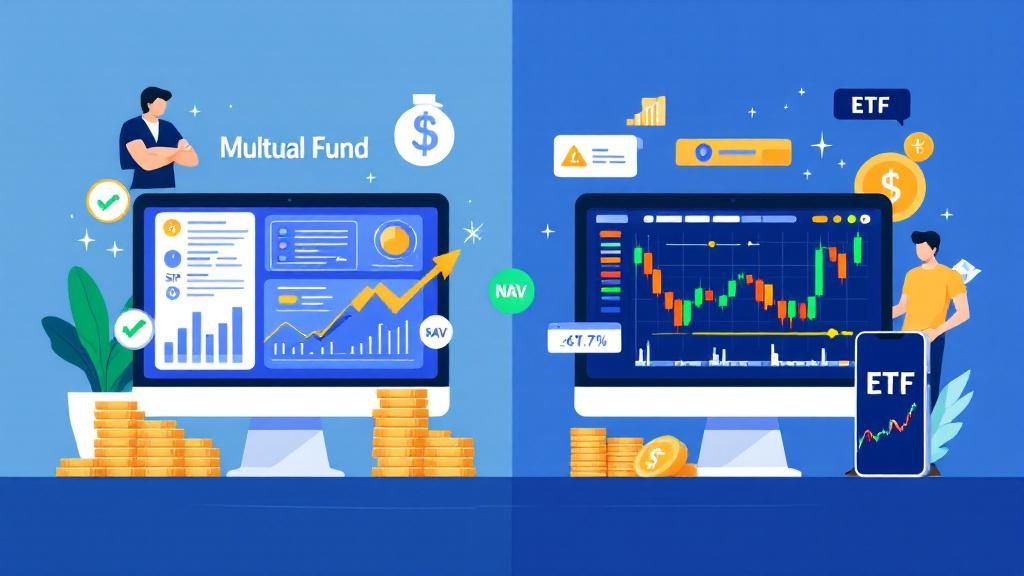🧠 Introduction: Mutual Fund vs ETF – What Every Smart Investor Should Know
In today’s investment world, two names often dominate the conversation: mutual funds and ETFs (Exchange Traded Funds). If you’re trying to grow your wealth, plan for retirement, or diversify your portfolio, understanding the mutual fund vs ETF debate is essential.
Both are excellent investment vehicles designed to pool money from multiple investors and spread it across various assets like stocks, bonds, or commodities. But they work in different ways — and choosing the right one can significantly affect your returns, tax bill, and even peace of mind.
So, which is better — ETF or mutual fund? This guide breaks it all down, plain and simple.
📊 What Is a Mutual Fund?
A mutual fund is a type of investment vehicle managed by a professional fund manager. Your money is pooled with other investors and used to buy a diversified mix of assets based on the fund’s objective.
🔍 Key Features of Mutual Funds:
-
Actively or passively managed
-
Priced once daily based on Net Asset Value (NAV)
-
May have minimum investment requirements
-
Ideal for automatic reinvestment and SIPs (Systematic Investment Plans)
🧾 What Is an ETF (Exchange Traded Fund)?
An ETF, or exchange traded fund, is a basket of securities that trades on a stock exchange—just like a stock. ETFs are typically passively managed and track indexes like the Nifty 50, S&P 500, or gold prices.
🔍 Key Features of ETFs:
-
Traded throughout the day (intraday trading)
-
Usually lower fund expense ratios
-
High liquidity due to stock exchange trading
-
No minimum investment (you can buy a single unit)
⚖️ ETF vs Mutual Fund Difference: Head-to-Head Comparison
Let’s compare mutual funds and ETFs across the key areas that matter most to investors:
| Feature | Mutual Funds | ETFs |
|---|---|---|
| Pricing | Once per day (NAV) | Real-time (market price) |
| Management | Active or passive | Mostly passive |
| Expense Ratio | Typically higher | Lower |
| Liquidity | Less liquid (cannot trade instantly) | Highly liquid (can trade anytime) |
| Minimum Investment | ₹500 – ₹5,000 (varies) | Price of 1 unit |
| Rebalancing | Done by fund manager | May require manual action |
| Capital Gains Distribution | May occur annually | Lower capital gains distributions |
| Intraday Trading | Not possible | Possible |
| Tax Efficiency | Lower for active funds | Higher due to in-kind transfers |
💡 Mutual Funds vs ETFs for Beginners: Which One Is Easier?
For beginner investors, mutual funds might feel more intuitive because:
-
You can start a SIP with a small amount.
-
Fund managers make all decisions.
-
Ideal for automatic reinvestment and long-term goals.
On the other hand, ETFs are perfect for tech-savvy beginners who:
-
Want to trade independently
-
Prefer lower costs
-
Like more control and transparency
🧩 Mutual Funds vs ETFs Pros and Cons
✅ Pros of Mutual Funds:
-
Professionally managed
-
Easy for long-term SIPs
-
Good for retirement planning
❌ Cons of Mutual Funds:
-
Higher expense ratios
-
Less tax-efficient
-
Cannot trade intraday
✅ Pros of ETFs:
-
Low cost and transparent
-
Traded anytime on stock exchange
-
Tax-efficient (especially in India & US)
❌ Cons of ETFs:
-
Requires demat and trading account
-
No SIP support (in traditional form)
-
You need to manage rebalancing
🏦 Index Fund vs ETF vs Mutual Fund – A Quick Clarification
Many confuse index funds with ETFs and mutual funds. Here’s how they differ:
-
Index Fund: A mutual fund that mirrors an index. Managed like a mutual fund but passively.
-
ETF: Also mirrors an index, but trades like a stock.
-
Mutual Fund: Can be actively or passively managed.
💡 Tip: If you prefer simplicity and SIPs, go with index mutual funds. If you want flexibility and intraday liquidity, choose index ETFs.
🎯 Passive Investing ETF vs Mutual Fund – Which Strategy Wins?
Passive investing is about “buying and holding” a broad market index rather than trying to beat it.
-
ETFs are more popular for passive investing due to lower costs and tax efficiency.
-
Index mutual funds also work well if you’re a hands-off investor.
📌 Smart Strategy: Choose passive ETFs or index mutual funds with low expense ratios for long-term wealth creation.
👴 Mutual Funds vs ETFs for Retirement – Which to Choose?
Planning for retirement? Here’s what to consider:
-
Mutual funds are better if:
-
You want to set up a monthly SIP
-
Prefer automated investing
-
Don’t want to worry about trading
-
-
ETFs are better if:
-
You have a demat account
-
You want lower expenses
-
You want control over your asset allocation and timing
-
📘 Real-life Example:
Ravi, a 35-year-old software engineer, uses index mutual funds for SIPs toward retirement. His brother, Arjun, prefers ETFs for their low cost and trades during market dips.
🔁 Diversification Strategy and Portfolio Rebalancing
Both ETFs and mutual funds help with diversification — reducing risk by spreading your money across multiple assets.
-
Mutual funds handle diversification and rebalancing automatically.
-
ETFs require manual portfolio rebalancing unless you use a robo-advisor.
💸 Understanding Costs: Fund Expense Ratio
The fund expense ratio is the annual fee charged by the fund house. It directly affects your returns.
-
ETFs generally have lower expense ratios (as low as 0.10%).
-
Actively managed mutual funds may charge 1.5% or more.
🧮 Over 20 years, that 1% difference can significantly reduce your overall returns.
💧 Liquidity of ETFs vs Mutual Funds
-
ETFs offer higher liquidity because they can be sold anytime during market hours.
-
Mutual funds can only be redeemed at day-end NAV.
🏁 If you may need quick access to your money, ETFs are more flexible.
📑 Conclusion: Mutual Fund vs ETF – Which Is Better for You?
There’s no one-size-fits-all answer to which is better: ETF or mutual fund? It depends on your:
-
Investment goals
-
Level of involvement
-
Cost sensitivity
-
Tax preferences
-
Access to tools like a demat account
✅ Choose mutual funds if you want:
-
Simplicity and automation
-
SIPs and long-term compounding
-
Professional fund management
✅ Choose ETFs if you prefer:
-
Low fees and tax efficiency
-
Intraday trading flexibility
-
Greater control over your investments
📈 Pro tip: Many smart investors use both — ETFs for passive core holdings and mutual funds for actively managed exposure or SIPs.
❓ FAQs: Mutual Fund vs ETF – Smart Investor’s Questions Answered
1. What is the main difference between exchange traded fund vs mutual fund?
An ETF trades like a stock on exchanges and is priced in real time. Mutual funds are priced once daily and are bought/sold via the fund house.
2. Which is better ETF or mutual fund for long-term investing?
For long-term investing, index mutual funds (via SIP) and passive ETFs both work. Choose based on your preferred platform and cost structure.
3. Do ETFs pay dividends like mutual funds?
Yes, many ETFs distribute dividends, or you can choose ones that automatically reinvest them (check the fund type).
4. Can I start SIPs with ETFs?
Traditional SIPs aren’t available with ETFs directly. However, some platforms allow automated ETF purchases monthly.
5. Are ETFs safer than mutual funds?
Both are regulated and generally safe. Risk depends on the underlying assets, not the fund structure.
6. What about tax on capital gains distribution?
Mutual funds may distribute capital gains annually. ETFs are more tax-efficient as most don’t trigger capital gains unless sold.
7. Which is better for retirement: ETF or mutual fund?
Mutual funds with SIPs are ideal for disciplined retirement saving. ETFs are better if you want lower costs and can manage trades.
📌 Final Thoughts
Understanding the mutual fund vs ETF debate is key to building a smarter, more efficient investment strategy. Both offer access to diversified assets, and both have a place in a well-rounded portfolio.
So whether you’re building wealth passively, planning for retirement, or just starting out — make your decision based on costs, convenience, and your comfort level. That’s the real secret to smart investing.








Comments (0)